
20th of December, 00 - participants arrive. Ten
children, each accompanied by a guardian. They have an introductory session in the evening
after which they retired for the day. 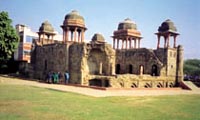
21st morning found them in our head office at Tughlakabad Institutional Area
where they were shown around and learnt how Gobar Times is produced. After lunch they went
for an eco-tour to te traditional water harvesting sites at Mehrauli.
22nd started very early for them. All set at 6.00 am to go to Alwar. They
reached Tarun Bharat Sangh (TBS), an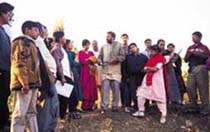 NGO, which is working with many villages in Alwar by afternoon. TBS and the
villagers have worked together to construct and repair many abandoned johads, the
traditional water harvesting structures in the area. They have been able to revive the
dried up Arvari river and formed their river parliament called arvari sansad to
solve disputes arising in water and land management and sharing. Mining is one of the
prime reasons for land degradation in the area and the villagers have been fighting the
mining lobby with the help of TBS.
NGO, which is working with many villages in Alwar by afternoon. TBS and the
villagers have worked together to construct and repair many abandoned johads, the
traditional water harvesting structures in the area. They have been able to revive the
dried up Arvari river and formed their river parliament called arvari sansad to
solve disputes arising in water and land management and sharing. Mining is one of the
prime reasons for land degradation in the area and the villagers have been fighting the
mining lobby with the help of TBS.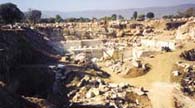 20
Rajendra Singh, the secretary of TBS gave the children a talk on water and land issues. A
20
Rajendra Singh, the secretary of TBS gave the children a talk on water and land issues. A
long walk through the fields had the children panting for breath. Tired and fascinated,
they went ahead to see the johads and then returned to a simple meal at TBS. Nights
were beautiful with star strewn sky that most children had never seen. They have developed
a forest in the premises of TBS, which further increased the biting cold of December. 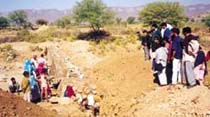
On the 23rd Another village to see a johad under construction and talk
with the local people. A first hand account of the problems faced by the villagers, the
coming of TBS and how they solved them. A packed lunch of cabbage and puris eaten in the
fields and an intimate interaction with goats and other grazing animals made the day.
Children reenacted ‘Dilwale Dulhaniya le Jayenge’ in the mustard fields within
the village.
After 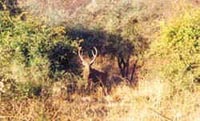 all the understanding
and learning, it was fun time on the 24th of December. They went to the Sariska
Tiger Reserve, saw sambars and neel gais, deer and peacocks and then had a talk with the
field director to understand a bit of forest management. Then it was time to get back to
Delhi.
all the understanding
and learning, it was fun time on the 24th of December. They went to the Sariska
Tiger Reserve, saw sambars and neel gais, deer and peacocks and then had a talk with the
field director to understand a bit of forest management. Then it was time to get back to
Delhi.
The trip concluded on the 25th of December. A concluding session at IHC
where children made a presentation of everything they learnt from the trip. Entries and
excerpts of entries were on display. So instead of celebrations, there were practice
sessions for the children’s presentation, which they made in the form of a play.
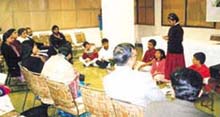 The Work Book At the beginning of the trip each child was given a
work book that they
The Work Book At the beginning of the trip each child was given a
work book that they
filled during the course of the trip.

Jayant Silva
What I liked the most was the way the people in
Alwar got together and decided to improve their natural resources and take care of them
through mutual co-operation and understanding. The trip was an extremely enjoyable and
enlightening experience. What I learnt from the trip is that most of us have a wrong idea
that people are poor for want of money...they are poor because of lack of natural
resources. Also I learnt that villagers lead a life that is much better than we do in many
respects.... They have so much of time, they are free to do whatever they want, they
co-operate with each other to solve their problems. And so on……..
The most unforgettable experience was the ride in
the jeep in Sariska
Vasundhara Jairath
What I liked the most?
It was the cooperation between the people that amazed me most. I mean us; educated people
in the cities refuse to cooperate with one another for reasons, which I fail to
understand. Johads or no johads, if there isn't any cooperation between the
people, simply nothing can be done. They are illiterate people in the village and have
achieved so much more. They live in harmony with each other...and everything is to the
credit of cooperation...johads come second.
Nothing was bad...couldn't be anything.
Rajasthan...the only thing was the food (no offence!!!). Everything was just so perfect
apart from that!!!
What I learnt from it...that cooperation is what
we need the most...to do anything, the first thing required is cooperation.
It certainly WAS an experience of a lifetime.
Something I won't forget for the rest of my life. Going into those fields, going for walks
in the night at the TBS Ashram walking back from Gopalpura, the bus journeys, being with
people from all over India...the whole trip! Something to tell my grandchildren about!
Raghuvir Bin Kasturi
The most enjoyable moment on the trip was when I saw
the look on that man's face, when Rajendra Singh took us to that farm place, and that old
man looked very happy, even though there had been a drought in Rajasthan for 3 years. But
I intensely disliked the cold.
The food in TBS was very good especially the ‘daal
bhaati’.
 Back to the Index Page
Back to the Index Page